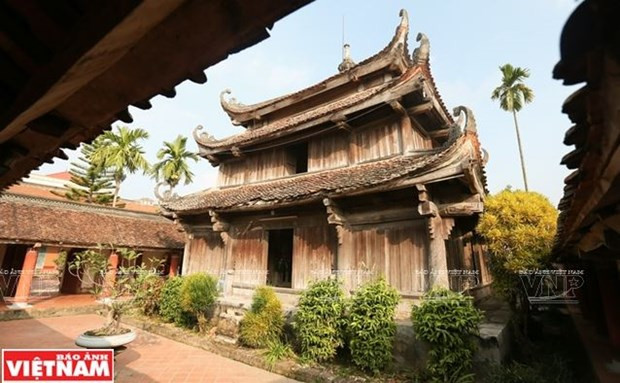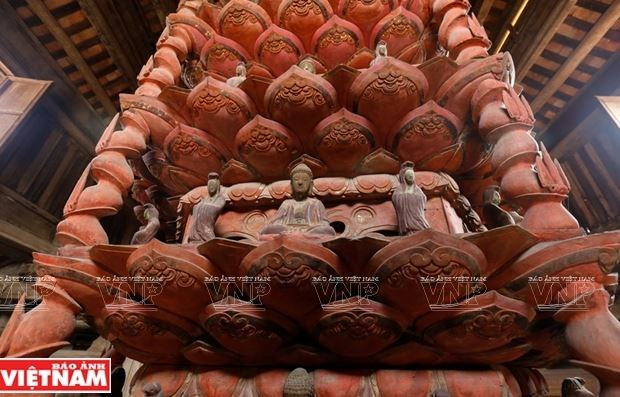 Cuu Pham Lien Hoa (nine-story lotus tower) is a centuries-old wooden tower at the Giam Pagoda in Cam Giang district, Hai Duong province. (Photo: VNP/VNA)
Cuu Pham Lien Hoa (nine-story lotus tower) is a centuries-old wooden tower at the Giam Pagoda in Cam Giang district, Hai Duong province. (Photo: VNP/VNA)Hanoi (VNA) - Cuu Pham Lien Hoa (nine-story lotus tower) is a centuries-old wooden tower at the Giam Pagoda in Cam Giang district, Hai Duong province. The nine-story lotus tower is a valuable Buddhist work of art showing Viet Nam’s art of ancient wood carving.
Cuu Pham Lien Hoa is a 300-year-old wooden tower, which is 4.44 meters tall. The tower has six symmetrical sides, each measuring 1.2 meters.
The tower has nine stories with five lotus petals on each story. The nine stories represent the nine grade stages of achievement in Buddhism.
To create this impressive tower, old artisans set up an ironwood pillar in the middle and six golden bamboo columns around it which were carved in the shape of a dragon.
On each story of the tower are 18 Buddhist statues. The biggest statue is on the highest story. With a total weight of about four tons, the tower can still spin with the light touch of a hand.
Cuu Pham Lien Hoa is an antiquity that has important values of art and Buddhist architecture. Along with two other nine-story lotus towers at the But Thap pagoda in the northern province of Bac Ninh, and the Dong Ngo pagoda in the northern province of Hai Duong, Cuu Pham Lien Hoa at the Giam Pagoda is a masterpiece of Vietnam traditional wood carving art related to Buddhism that is still preserved.
But Thap Pagoda, courtesy name Ninh Phuc Tu, is one of the most beautiful of its kind in the Red River Delta region and home to four groups of national treasures that have been kept almost intact. Aside from its historical and architectural values, But Thap also boasts four groups of national treasures, including the thousand-hands and thousand-eyes Avalokitesvara statue that was recognised in 2012. The statues of the Buddhas of the three times, the nine-story lotus tower, and the altar earned the recognition in 2020.
Dong Ngo Pagoda in Tien Tien Commune is one of the oldest pagoda in Hai Duong Province, built during the Dinh Dynasty more than 1,000 years ago. Its most significant feature is the nine-story lotus tower, a unique Buddhist artwork dating to 1692. This artwork originates from a ritual of praying and rotating an object - a pendulum or a bell or this lotus tower - at the same time. This ritual is believed to allow prayers and wishes to be delivered to heaven. The tower symbolises the spiritual levels that Buddhists have to practice from the first story to the ninth.
On each story of this 5m high lotus-shaped tower there are 18 wooden Buddhist statues sitting on lotus. Besides its artistic values, the tower conveys a message of compassion, altruism and charity and shows the development of the Truc Lam Yen Tu Zen Sect in Vietnam during the 17th-18th centuries.
 The nine-story lotus tower is a valuable Buddhist work of art showing Vietnam’s art of ancient wood carving. (Photo: VNP/VNA)
The nine-story lotus tower is a valuable Buddhist work of art showing Vietnam’s art of ancient wood carving. (Photo: VNP/VNA)Cuu Pham Lien Hoa at the Giam Pagoda also has historical values very useful for scientific research. The tower was recognised as a national treasure in 2015.
Giam Pagoda (also known as Nghiem Quang temple) is located in Cam Son commune, Cam Giang district, Hai Duong province.
The pagoda is also a place worshipping Zen Master Tuệ Tĩnh, a well-known physician in Vietnamese traditional medicine. Built during the Ly dynasty, the pagoda was restored in the 14th century.
The pagoda was rebuilt on a large scale from the late 17th century to the early 18th century and was classified as a national relic in 1974.
The Giam Pagoda is a well-known relic where many national treasures are kept, including ancient Buddhist statutes, large bells and stone steles./.


























